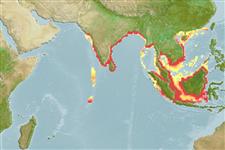>
Clupeiformes (Herrings) >
Dorosomatidae (Gizzard shads and sardinellas)
Etymology: Tenualosa: Latin, tenuis = thin + Latin, alausa = a fish cited by Ausonius and Latin, halec = pickle, dealing with the Greek word hals = salt; it is also the old Saxon name for shad = "alli" ; 1591 (Ref. 45335).
More on author: Valenciennes.
Environment: milieu / climate zone / depth range / distribution range
بوم شناسي
دريايي; آب شيرين; لب شور; رود کوچ (Ref. 51243); تغييرات عمق 10 - ? m (Ref. 26929). Tropical; 23°N - 7°S, 70°E - 119°E (Ref. 54917)
Indo-West Pacific: India to the Java Sea and the South China Sea. Newly recorded from Mauritius (Ref. 33390). May be found in Cambodian Mekong near the Viet Nam border (Ref. 12693).
Length at first maturity / Size / Weight / سن
Maturity: Lm 29.0 range ? - ? cm
Max length : 60.0 cm TL جنس نر / بدون خواص جنسي; (Ref. 12693); common length : 40.0 cm TL جنس نر / بدون خواص جنسي; (Ref. 4832); بيشينه سن گزارش شده: 2.00 سال ها (Ref. 26929)
خارهاي باله پشتي (کل) : 0; خارهاي باله مخرجي: 0. Belly with 28 to 30 scutes. A distinct median notch in upper jaw, which distinguishes it from other similar clupeids, except Hilsa kelee. Gill rakers fine but not numerous, 60 to 100 on lower part of arch. Caudal fin short. At most, a dark diffuse mark behind gill opening, but no other spots on flank.
Inhabits fast-flowing, turbid estuaries and adjacent coastal waters (Ref. 26929). Schooling in coastal waters, euryhaline and perhaps anadromous, ascending rivers to breed (but in some areas fishery workers claim that it does not). A protandrous hermaphrodite (Ref. 55367). Presumably its biology is similar to that of T. ilisha, but the fewer gill rakers suggest that it takes larger food organisms. Reported to feed on zooplankton (Ref. 58784). More data needed especially since it is not always distinguished from T. ilisha, especially at juvenile stages. Marketed fresh or dried-salted.
Life cycle and mating behavior
Maturities | تولید مثل | Spawnings | Egg(s) | Fecundities | توزاد ( لارو)
A semelparous species, but although each individual spawns only once and then dies, the spawning season for the species as a whole lasts from May to November (Ref. 26929). A monandric species (Ref. 55367). Sex change occurs at a length of 11.0 cm TL and 1.24 years of age (Ref. 55367).
Whitehead, P.J.P., 1985. FAO Species Catalogue. Vol. 7. Clupeoid fishes of the world (suborder Clupeoidei). An annotated and illustrated catalogue of the herrings, sardines, pilchards, sprats, shads, anchovies and wolf-herrings. FAO Fish. Synop. 125(7/1):1-303. Rome: FAO. (Ref. 188)
وضعيت در فهرست قرمز IUCN (Ref. 130435)
خطر برای انسان ها
Harmless
استفاده انسانی
ماهي گيري – شيلات: با ارزش تجاري بالا
ابزارها
گزارش های ويژه
بارگيری XML
منابع اينترنتي
Estimates based on models
Preferred temperature (Ref.
123201): 27.1 - 29.2, mean 28.6 °C (based on 466 cells).
Phylogenetic diversity index (Ref.
82804): PD
50 = 0.5312 [Uniqueness, from 0.5 = low to 2.0 = high].
Bayesian length-weight: a=0.00977 (0.00595 - 0.01605), b=3.09 (2.95 - 3.23), in cm total length, based on LWR estimates for this species & (Sub)family-body (Ref.
93245).
Trophic level (Ref.
69278): 2.5 ±0.00 se; based on food items.
Generation time: 1.6 ( na - na) years. Estimated as median ln(3)/K based on 1
growth studies.
جهندگی (Ref.
120179): زياد, كمينه زمان لازم براي دو برابر شدن جمعيت ، كمتر از 15 ماه (K=0.7; assuming tmax>3, fec > 10,000).
Fishing Vulnerability (Ref.
59153): Low to moderate vulnerability (27 of 100).
Climate Vulnerability (Ref.
125649): Very high vulnerability (89 of 100).
Nutrients (Ref.
124155): Calcium = 75.7 [56.7, 102.9] mg/100g; Iron = 2.21 [1.28, 3.67] mg/100g; Protein = 16.9 [16.1, 17.7] %; Omega3 = 0.553 [0.268, 1.150] g/100g; Selenium = 50 [21, 122] μg/100g; VitaminA = 14.2 [4.8, 42.5] μg/100g; Zinc = 1.19 [0.77, 1.98] mg/100g (wet weight);
